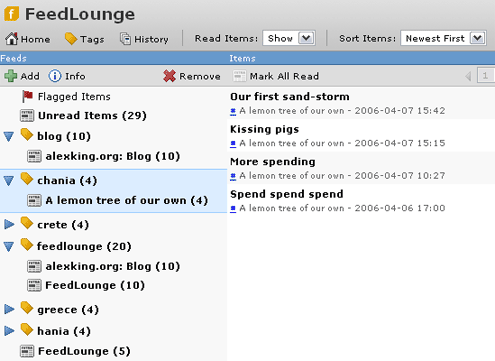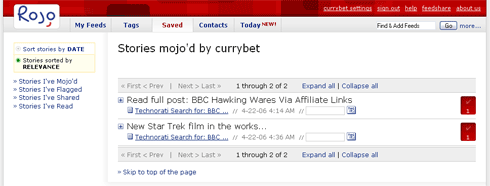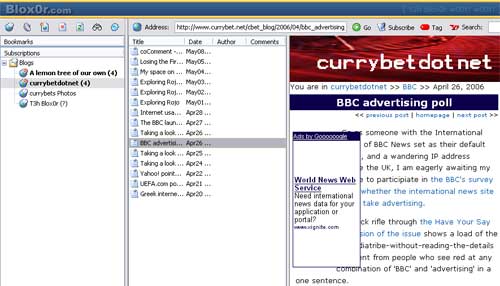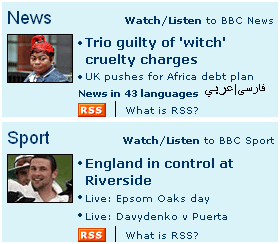The lost art of RSS reading
When I was teaching “So you think you want to be a UXer?” at the Guardian the other day, I gave a list of five websites that I thought were essential regular reading for any budding UXer. I suggested they pop them in their RSS reader to generally blank looks all round. I prompted for a show of hands, and out of a group of 40 people - who were all involved in making the web in one way or another - only a couple put their hands up to admit to using RSS readers.
I would say that I was shocked and appalled, except I wouldn’t have put my hand up myself. My Google Reader account, which was subscribed to hundreds of feeds, has long lain dormant.
I was a massive advocate of RSS usage. When I resumed blogging in 2006 after several months break spent travelling, the first series of posts I wrote was a comparison of various different web-based RSS readers. At the times I was a Bloglines loyalist. FeedLounge, Rojo, Google Reader and (bizarrely) T3h Blox0r were the other services I toyed with.



Screenshots of RSS readers in 2006
I also wrote several posts looking at which newspapers RSS feeds were most popular. My first brush with FUMSI, whom I later had an editor role with, was writing a piece about RSS feeds, which is now hopelessly out-of-date and behind their archive paywall.
At the BBC I pushed for the little orange RSS icon to be included on the BBC homepage, in the belief that getting it to appear in this prime location would help drive user familiarity with the idea.

RSS icons on the BBC homepage in 2005
Yet, by the end of my tenure at the Guardian, I was advocating that the logo be removed from the Guardian site altogether, on the grounds that browsers auto-detect RSS feeds, and that should be enough for the niche power users who want to access them.
As a consumer proposition, I always found that once people realised what RSS readers could do for them, they loved them. But it was a hard learning curve. Clicking an RSS icon didn’t take you to anything wonderful - browsers in the mid-2000s generally displayed a barely-styled XML document tree. Not the most welcoming of user experiences. To the uninitiated it looked more like you’d broken the internet than discovered its amazingly powerful hidden news delivery mechanism.
At the time the icon arrived at on the BBC homepage I blogged:
“I think the major uptake of RSS as an end customer proposition is still a long way off. We need to show people how RSS is useful to them. And probably give it a name that isn’t a three letter geek acronym. My dad would understand a link marked ‘Email the BBC’. I doubt he’d follow an icon that said ‘SMTP/POP3 us’”
With social media, people now effectively make their own mashed-up feeds. The average user’s Twitter stream or Facebook news feed is a rag-tag mixture of conversational snippets from their friends, interspersed with the brands and company presences that they’ve “Liked” or “Followed”.
The principle of the stream of content that comes to you very much triumphed on the internet. It just wasn’t RSS readers that packaged it right for the consumer.
Still, whilst I was teaching the course I was reminded of how much I enjoyed reading RSS feeds in the morning, and so I’ve set up a new sparsely populated Google Reader account, and I’m going to try and re-integrate it back into my daily routine. Instead of the serendipity link engine that my Twitter feed gives me, I’m going to invest a bit more time in reading a curated list of selected sources. It will be interesting to see what impact (if any) that might have on the link selection in my regular Friday Reading blog post.
I would struggle to understand how any heavy internet user would function without RSS feeds, and I shudder in fear whenever anyone suggests that they are on their way out.
Yes, twitter can replace RSS - if the twitter feed is a pure duplicate of it, but I really don't think Twitter is the right place for it anyway.
I use RSS massively, and get through well over 1,000 headlines per day, mainly press release feeds. I cannot see Twitter enabling me to skim down them as fast as I can do in Google Reader.
The outrage when Google revamped its Reader to be more like a browsing environment than one people use to swiftly skim down shows how important it is for swiftly consuming vast quantities of headlines in a very short timeframe.
For those websites without RSS (argh!), I have a dedicated program which scans the pages whenever I run it to check for changes and highlights them - nothing like as efficient as an RSS feed, but it fills the holes.
RSS is not perfect - but most of the problems lie in the implementation not the underlying technology.
Yes, I’m sure there are a lot of power users out there still addicted to RSS readers - I was just surprised that in a class of 40 people doing web stuff hardly anybody did. It is a bit like that thing where you ask journalism students who buys a newspaper every day, and nobody puts their hand up, and then you ask them if they think the industry has a future... :-)
I see RSS more as a transport these days. I use a service that forwards my RSS feeds to a Twitter account, which I then follow.
It always surprises me how few people actually use RSS. Personally, I couldn't live without Reeder for my subscriptions – any other way of keeping up to date with all those blogs just seems dumb to me!
My RSS reading was regenerated by the iPad - it's the prefect device for it. Try Reeder or Mr Reader - both apps are excellent interfaces for your Google Reader account.
I kept forgetting to open Reader too until I found Snackr - it presents the stories in Reader in a perpetual ticker across the bottom of your screen - awesome for serendipity.
Cheers @IanVisits - I hadn't noticed you can switch to headlines-only in Reader - that's gonna save me a heap of time (um, when I get around to logging in).
RSS and Twitter are a potent combination for me. I carefully follow what I consider to be the right people within my industry on Twitter to stay on top of new developments that are directly, vocationally relevant. Whereas I subscribe to a more eclectic range of blogs and feeds via RSS so as to ensure a steady stream of indirectly relevant stimuli. I keep the number of RSS subscriptions roughly constant but churn by 10% or so every month to keep things fresh.
Also RSS is my most precious social technology. I try to make a point of commenting regularly and some of the relationships developed over time as a result are among the warmest on any of the platforms that I use.
I really think I wouldn't know half the things I do without using an RSS reader over the past 3-5 years. Seriously... Twitter is great and I find tons of good content to read on Twitter. But I can't sit on Twitter all day at work. The firehose is great for jumping in and out. But it's not good for consistently staying up with certain sources (like this one). At my company, I really feel like I'm more in touch with a whole number of things compared to my coworkers and I think a big reason is the RSS.
Have you guys tried Feedly? (Disclaimer: I have no affiliation or interest in the company.) It is so fantastic. It turns the RSS reader on its head and takes away any fear a regular person would have of it. The content is formatted beautifully and feeds are as easy as adding as going to a website. Check it out.
I should add that it has been pointed out to me by one of the people who was there on Twitter that they didn’t put there hand up as the thought the question was a leading one, and a set-up for some mockery...
"I gave a list of five websites that I thought were essential regular reading for any budding UXer." Curious which sites you recommended.
“Curious which sites you recommended.” - you can come to the course or buy the forthcoming book... ;-)
The wonderful benefits of an RSS reader over Twitter is the ability to store and save. Twitter is simply too here-and-now for me. If I leave it a few hours (days or weeks) then I'd miss out on quality content I'd be interested in.
Actually I barely click links in Twitter. Too much to do.
My RSS reading is as plentiful as every, but rarely via a web-browser. I suspect Google messing around with the design put a lot of people off and I'm very keen on the philosophy of reading for relaxation and an opportune moments; nowadays I'm addicted to "Reeder" on the iPhone (one of those apps that's so beautifully designed it's a pleasure to use - see also Sparrow, Chrome for iOS, Simplenote, Prompt, Trello, Timer, Toggl and the new Apple Podcasts app - but crucially Reeder ls now sufficiently mature that you can add feeds and manage all your folders from within it - I don't need to even visit the Google Reader site to do that.) On the iPad I use another great app called 'Mr Reader'.
The other thing that's vastly improved the experience for me is Readability - it's much more fun to read stuff on mobile now when you can just hit the armchair icon and have it all reformatted for you without needing to open a new tab and wait for a substandard (in comparison with a laptop/desktop) process to render all the ads and other junk on the original page, which you then have to pinch and swipe your way through. As a result Google Reader 'Trends' shows I'm reading stuff across the day and across the week.
Instapaper changed my life too. I wonder how many of them would have heard of that? Pinboard? Do they use bookmarklets? Send things to a Kindle?
Of course it doesn't help that you have to download an extension to get the RSS icon (the nice square one - there ought to be no need for people to know the abbrieviation) to appear in the Chrome address bar, or that Safari has just dropped RSS support completely.
Flipboard on the iPad (and iPhone) turns any RSS feed into a stylish magazine. You can just type in the search bar, and it supports Google Reader sync.
I gradually became disenchanted with Google Reader last year, what with being too lazy to sign in and scan lots of feeds. However, Google Reader on my Samsung Galaxy Note has been a revelation. The widget is plain to look at, which is to my liking (Feedly is good, but even the slightest visual panache distracts me from the text), and the Note's large screen saves me from eye-strain. It's the net as it should be: efficient, informative, enjoyable and surprising.
Google Reader on the Note has rejuvenated my love for the internet. I have thousands of articles in dozens of folders, all waiting for me to peruse them on my phone when I'm at a loose end. No signing-in, no endless tracking with a mouse or scroll-wheel, and no adverts. Using swipe gestures to explore unread articles is very intuitive.
RSS feed bundles make a good starting point; I may have found Currybet.net in one of them. If you have friends who surf a lot, persuade them to try a feed reader. Those little orange boxes are the keys to the kingdom :)
I couldn't agree more with the comments here in support of RSS. I'm a casual "everything" user. I'm a casual Twitter user, a casual RSS user and a (I-hate-to-admit-it) casual blogger. Google Reader curates blogs and news sources for me in an organized manner that would take much more effort to set up in Twitter so that I could parcel and retrieve the information as easily as RSS allows.
I also find following RSS feeds via Google Reader to be pretty easy, but I suppose many things seem daunting the first time you try them.